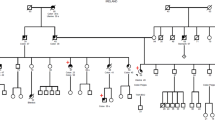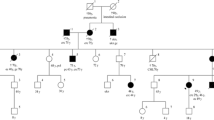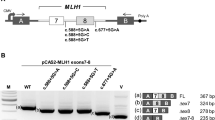Abstract
Lynch syndrome, a heritable form of cancer predisposition, is caused by germline mutations within genes of the DNA mismatch repair family, and can be rapidly identified in young onset cancer patients through the detection of loss of expression of at least one of these genes in tumour samples. To date, such causative mutations have only been identified within exonic and splice site regions. Though this approach has been successful in the majority of families, a considerable number remain in which no mutation has been found. To address this situation, we used an alternative mutation discovery procedure which involved haplotype analysis of the locus containing the gene lost in the tumour and delineation of segregating haplotypes, followed by an investigation of splicing aberrations to uncover cryptic splice sites which lay outside the genomic regions routinely examined for mutations. In this report, we show that an intronic mutation 478 bp upstream of exon 2 in the MSH2 gene causes Lynch syndrome through creation of a novel splice donor site with subsequent pseudoexon activation, thus highlighting the need for more extensive sequencing approaches in families where routine procedures fail to find a mutation.



Similar content being viewed by others
References
Jemal A, Siegel R, Xu J, Ward E (2010) Cancer statistics. CA Cancer J Clin. doi:10.3322/caac.20073
Vasen HF, Watson P, Mecklin JP, Lynch HT (1999) New clinical criteria for hereditary nonpolyposis colorectal cancer (HNPCC, Lynch syndrome) proposed by the International Collaborative group on HNPCC. Gastroenterology 116(6):1453–1456
Umar A, Boland CR, Terdiman JP et al (2004) Revised Bethesda Guidelines for hereditary nonpolyposis colorectal cancer (Lynch syndrome) and microsatellite instability. J Natl Cancer Inst 96(4):261–268
Lindor NM, Burgart LJ, Leontovich O et al (2002) Immunohistochemistry versus microsatellite instability testing in phenotyping colorectal tumors. J Clin Oncol 20(4):1043–1048
Ligtenberg MJ, Kuiper RP, Chan TL et al (2009) Heritable somatic methylation and inactivation of MSH2 in families with Lynch syndrome due to deletion of the 3′ exons of TACSTD1. Nat Genet 41(1):112–117. doi:10.1038/ng.283
Mann A, Hogdall E, Ramus SJ et al (2008) Mismatch repair gene polymorphisms and survival in invasive ovarian cancer patients. Eur J Cancer 44(15):2259–2265. doi:10.1016/j.ejca.2008.07.010
Schafmayer C, Buch S, Egberts JH, et al (2007) Genetic investigation of DNA-repair pathway genes PMS2, MLH1, MSH2, MSH6, MUTYH, OGG1 and MTH1 in sporadic colon cancer. Int J Cancer 121(3):555–558. doi:10.1002/ijc.22735
Newcomb PA, Baron J, Cotterchio M et al (2007) Colon Cancer Family Registry: an international resource for studies of the genetic epidemiology of colon cancer. Cancer Epidemiol Biomark Prev 16(11):2331–2343. doi:10.1158/1055-9965.EPI-07-0648
Walsh MD, Buchanan DD, Cummings MC, et al Lynch syndrome-associated breast cancers: clinicopathologic characteristics of a case series from the colon cancer family registry. Clin Cancer Res 16(7):2214–2224. doi:10.1158/1078-0432.CCR-09-3058
Clendenning M, Baze ME, Sun S et al (2008) Origins and prevalence of the American Founder Mutation of MSH2. Cancer Res 68(7):2145–2153. doi:10.1158/0008-5472.CAN-07-6599
Sugden B, Mark W (1977) Clonal transformation of adult human leukocytes by Epstein-Barr virus. J Virol 23(3):503–508
Chillon M, Dork T, Casals T et al (1995) A novel donor splice site in intron 11 of the CFTR gene, created by mutation 1811 + 1.6kbA– > G, produces a new exon: high frequency in Spanish cystic fibrosis chromosomes and association with severe phenotype. Am J Hum Genet 56(3):623–629
Acknowledgments
We thank individual participants in the study who made this work possible and the contribution of the Jeremy Jass Memorial Pathology Collection. This work was funded by the National Cancer Institute, under RFA no. CA-95-011, and through a cooperative agreement with the Australasian Colorectal Cancer Family Registry (U01 CA097735). The content of this manuscript does not necessarily reflect the views or policies of the National Cancer Institute nor does mention of trade names, commercial products, or organisations imply endorsement by the US Government. JY is a Cancer Council Queensland Senior Research Fellow.
Author information
Authors and Affiliations
Corresponding author
Electronic supplementary material
Below is the link to the electronic supplementary material.
Rights and permissions
About this article
Cite this article
Clendenning, M., Buchanan, D.D., Walsh, M.D. et al. Mutation deep within an intron of MSH2 causes Lynch syndrome. Familial Cancer 10, 297–301 (2011). https://doi.org/10.1007/s10689-011-9427-0
Published:
Issue Date:
DOI: https://doi.org/10.1007/s10689-011-9427-0




